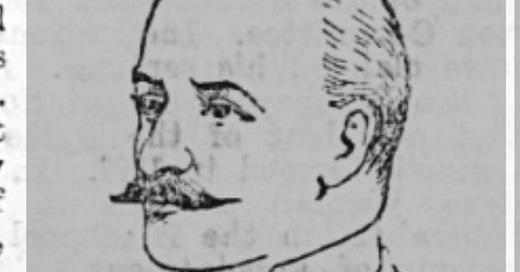Sergeant Standen and his family business
Standen's Detective Agency operated from the end of the 19th century until the end of World War 2: but who ran it?
This week, I'm looking at the history of a detective agency in the north-west of England, established by one individual, and later - a few years after his death - resuscitated by his son-in-law.
Standen's had originally been established by Jonathan Standen. Standen, born in Blackburn in 1854, had started life as a cotton weaver (as were his siblings). However, in 1877, at the age of 23, Standen joined the Manchester police, and over the course of the next 22 years, he worked his way up from police constable to detective sergeant in A Division. He spent a lot of time dealing with prostitution, and reckoned he knew most of the night-walkers in his division. In 1899, he retired from the police, and with the help of his police pension, he established himself as a private detective.
In 1902, he appeared in court to give evidence in a theatrical slander case. The manager of the Comedy Theatre in Manchester, John Pitt Hardacre, had had repeated police warnings about allowing 'bad characters' to enter the theatre, with there allegedly being drunken behaviour inside. Edward Holt, chair of the watch committee of the Manchester Corporation, had made a statement in a council meeting that Pitt was an unfit person to hold a dramatic licence with drink allowed. In response, Pitt Hardacre sued Holt for £5,000. Standen gave evidence that when he had policed the area that included the Comedy Theatre, he had never seen any prostitutes or other 'bad characters' be allowed into the theatre.
Theatre manager Pitt Hardacre, as drawn for the Blackpool Times, 29 November 1902 (via British Newspaper Archive)
Unfortunately, another private detective - Frederick Gould - also gave evidence. Frederick, who was based in Wandsworth, south London, was married to an actress who was playing at the Comedy Theatre. Mrs Gould had apparently complained about the drunkenness there. It seemed there was plenty of evidence to counterbalance Jonathan Standen's.
This was the same year that Standen advertised his services in the Manchester Evening News. One advert, from 24 July, stated:
DETECTIVE: Private Inquiries - Ex-Sergeant Standen, 33 Rial Street, Hulme: terms moderate.
Rial Street was Standen's home address; he does not appear to have had a separate business address. Unfortunately, Jonathan Standen was only able to work as a private detective for a couple of years - he died prematurely in 1907, aged only 56. Luckily, he was able to pass on his skills to his son, Bernard, who followed him into the police (a younger son, Joseph, was deemed 'feeble minded' from birth, and after his father's death, was sent to Withington Workhouse to be looked after). However, Standen's agency also survived for decades after its owner's death.
Jonathan Standen's son-in-law, Herbert Whittaker, was born in October 1887 - different censuses give different places of birth for him, including Crewe, but this was actually Herbert's father's place of birth. Herbert was actually born in Manchester and spent much of his life in South Manchester. He married Jonathan Standen's daughter in 1910, and the couple had two daughters - Lucy and Mary Patricia.
Herbert’s signature on his 1911 census return (TNA/TheGenealogist)
In 1911, Herbert Whittaker was still working as a commercial traveller - his father's trade - but within two years, he was a full-time private detective. It is likely that Standen's agency had died with its founder, but that Whittaker had then decided to start up as a private detective, using his father-in-law's name to give him some standing in the community. It had only been a few years since Standen's death, but his long career in the police was still remembered. The new Standen's agency had two offices - at one point, at 89 Mosley Street in Manchester, and later, a business address at Prudential Buildings in Stockport - and the Whittakers' home address at 7 Annable Road in Bredbury, which was his day-to-day office.
Herbert continued this job, running the detective agency in Stockport, until 1945. At this point, his beloved wife Mary suddenly died, and Herbert appears to have stopped his work at around this point. Although Herbert remarried at the end of 1947, his second marriage was shortlived: he died just two years later.
One of his later commissions came in 1943, when he was asked by oil manufacturer Samuel Slack to investigate his wife, Marjorie, who he suspected of having committed adultery. Samuel and Marjorie had married at Stockport in 1928, but in 1935, Marjorie had embarked on a cruise. There, she met one of the ship's officers, a married man named Walter Francis Dennison, and the couple developed a relationship. By 1940, the Slacks were separated, with Marjorie demanding, and receiving, maintenance money from her husband. When Samuel Slack decided he wanted a divorce, he asked Herbert Whittaker to investigate, wanting to ensure he had evidence of Marjorie's continuing affair (by this point, Dennison had left his wife). The evidence was easily obtained, and Samuel was granted his divorce.
Standen's operated, in one form or another, from about 1899 to 1945 - not bad going. Its two owners, linked by marriage, were very different people, with different experiences in their careers, but both had a shared interest in investigating people in the north-west. It seems there was no shortage of people to be investigated, as I'll continue to show next week.






Thanks for sharing such interesting stories Nell